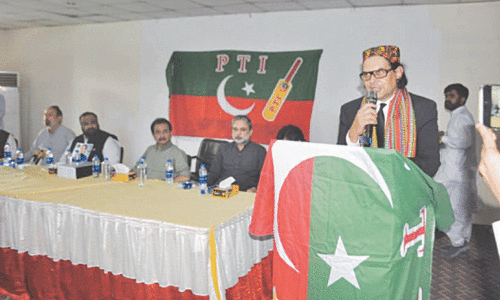
KARACHI: The federal government has issued 33 special permits to dignitaries of five countries of the Gulf region to hunt the internationally protected Houbara bustard during the hunting season 2013-14, it emerged on Tuesday.
According to sources, the government for the first time has informed the permit holders that Pakistan will “observe a moratorium on hunting during the 2014-15 season to replenish houbara bustard stocks” but conservationists keeping in view the power and influence of petrodollars are sceptical.
The foreign hunters included at least four kings/ emirs/ heads and five crown princes of their states — the United Arab Emirates, Qatar, Bahrain, Saudi Arabia, Kuwait — while others were their father/ uncles/ brothers/ relatives/ government officials and businessmen on the Arabian peninsula, the sources said.
They added that a new entry to the highly restricted list of hunters was that of the Emir of Kuwait, one of the richest countries in the region, who had been given the permit to hunt the highly rare and endangered Houbara bustard for the first time, the sources said.
The meat of Houbara bustard, according to a myth though not supported by any scientific study, has aphrodisiac qualities.
While small countries such as the UAE and Qatar had been granted 12 hunting permits each, the biggest and most influential country on the peninsula — the Kingdom of Saudi Arabia — had been given only two permits, the sources said. However, the sources added, the hunting area allocated to one royal hunter Sheikh Khalifa bin Zayed Al-Nahyan, whose father the late Sheikh Zayed bin Sultan Al-Nahyan was the pioneer of Houbara bustard hunting, spread over three provinces.
Some hunters had been given areas in two provinces, whereas a majority of the dignitaries had been allowed to hunt Houbara bustards in one of the provinces only.
Names of the hunters and the areas allocated to them as mentioned in the permits, which are person specific, issued in the first week of November by deputy chief of protocol Sardar Mohammad Khattak of the Foreign Affairs ministry are:
Saudi Arabia
Crown prince, first deputy prime minister and minister of defence of Saudi Arabia Salman bin Abdul Aziz Al-Saud has been allocated Vehari, Multan (Shujaabad tehsil), Mianwali and Sargodha districts in Punjab, and Dera Bugti, Dera Murad Jamali, Nasirabad, and Jaffarabad and Duki in Loralai district of Balochistan.
Tabuk Governor Prince Fahad bin Sultan bin Abdul Aziz Al-Saud has been allocated Chaghi (including Naukundi), Noshki (less the Noshki city) and Awaran district in Balochistan.
Abu Dhabi
President of the UAE and Ruler of Abu Dhabi Sheikh Khalifa bin Zayed Al-Nahyan has been granted Sukkur, Ghotki, Nawabshah and Sanghar districts in Sindh; Rahim Yar Khan, Rajanpur, Dera Ghazi Khan, and Chakwal in Punjab; and Zhob, Gawadar (Ormara and Pasni), Kharan (excluding Nag Dera breeding area), Panjgur and Washuk districts in Balochistan. Crown prince and deputy supreme commander of the UAE armed forces General Sheikh Mohammad bin Zayed Al-Nahyan has been given Lehri tehsil of Sibi district (the Domki area only) in Balochistan.
Deputy prime minister of the UAE Sheikh Sultan bin Zayed Al-Nahyan has been given Khairpur district including Kot Diji (excluding the area across the Nara Canal) in Sindh.
The Ruler’s representative in the western region Sheikh Hamdan bin Zayed Al-Nahyan has been given Dadu (Khairpur Nathan Shah, Johi tehsil and union council Fareedabad), Larkana (Ghaibi Dero), Shahdadkot, Khairpur (the area across the Nara Canal) districts in Sindh; and Lehri tehsil of Sibi (minus Domki area), Old Katchi and Sano Shoran of Bolan districts in Balochistan. Sheikh Sultan bin Khalifa bin Zayed Al-Nahyan, a member of the ruling family, has been given Qila Saifullah district including Kar Khurassan (less subdivision Muslim Bagh).
Dubai
Vice president of the UAE and ruler of Dubai Sheikh Mohammad bin Rashid Al-Maktoum has been given Muzaffargarh district in Punjab and Khuzdar and Lasbela districts in Balochistan.
Crown prince of Dubai Sheikh Hamdan bin Mohammad bin Rashid Al-Maktoum has been given Bhakar district in Punjab. Deputy ruler of Dubai and finance minister Sheikh Hamdan bin Rashid Al-Maktoum has been given Bahawalpur and Bahawalnagar (Fort Abbas district) districts in Punjab.
Maj Gen Sheikh Ahmed bin Rashid Al-Maktoum, who is deputy chief of police and general security in Dubai and a member of the ruling family, has been given Umerkot, Tharparkar including Mithi and Nagarparkar districts minus protected areas in Sindh.
Maj Gen Sheikh Ali Mur bin Maktoum Al-Maktoum has been given Jhang and Khushab districts in Punjab.
Sheikh Rashid bin Khalifa Al-Maktoum, a member of the royal family, has been given Badin, Thatta (Jungshahi) and Malir (Dhabeji) districts in Sindh.
Nasir Abdullah Lootah, a government official, has been allotted Thatta (excluding Shah Bunder and Jungshahi tehsils) district in Sindh.
Sheikh Mohammad Hilal bin Tarraf Al-Mansoori has been given Samungli in Balochistan.
Qatar
Emir of the State of Qatar Sheikh Tamim bin Hamad Al-Thani has been given Jacobabad district in Sindh.
Father of Emir and former Emir of State of Qatar Sheikh Hamad bin Khalifa Al-Thani has been given Bahawalnagar district (less Fort Abbas tehsil) in Punjab.
An uncle of the Emir of Qatar, Sheikh Mohammad bin Khalifa Al-Thani, has been given Loralai (excluding the Duki area) district in Balochistan.
A brother of the Emir of State of Qatar, Sheikh Jassim bin Hamad, has been given Musakhel tehsil and Drug in Musakhel district in Balochistan.
Sheikh Falah bin Jassim bin Jaboor Al-Thani, a brother of the prime minister, has been given Jhal Magsi district in Balochistan.
Former prime minister and foreign minister Sheikh Hamad bin Jassim bin Jabbar Al-Thani has been given subdivision Muslim Bagh in Qila Saifullah district in Balochistan.
Sheikh Khalid bin Thani Al-Thani, a member of the royal family, has been given Dadu city in Sindh and Layyah district in Punjab.
Sheikh Ali bin Abdullah Thani Al-Thani, a member of the royal family, has been given Turbat district in Balochistan.
Sheikh Abdullah bin Ali Al-Thani, another member of the royal family, has been given Dera Ismail Khan district in Khyber Pakhtunkhwa.
Another member of the royal family, Sheikh Thani bin Abdul Aziz Al-Thani, has been given Surab tehsil in Kalat district of Balochistan.
Sheikh Mohammad bin Ali bin Abdullah Thani Al-Thani, a member of the royal family, has been given Kingri tehsil in Musakhel and Barkhan districts in Balochistan.
Kuwait
Emir of the State of Kuwait Sheikh Sabah Al-Ahmed Al-Sabah has been given Kashmore district in Sindh and Lakki Marwat district in Khyber Pakhtunkhwa.
Bahrain
King of Bahrain Sheikh Hamad bin Isa bin Salman Al-Khalifa has been given Jamshoro (including Thano Bula Khan, Kotri, Manjhand and Sehwan tehsils) in Sindh. An uncle of the king, Sheikh Ebrahim bin Hamad bin Abdullah Al-Khalifa, has been given Mastung district in Balochistan.
King’s Adviser on Defence Affairs Sheikh Abdullah bin Salman Al-Khalifa has been given Jati tehsil of Thatta district in Sindh. Commander in chief of Defence Forces Marshal Sheikh Khalifa bin Ahmed Al-Khalifa has been given Toiser of Musakhel district in Balochistan.
A member of the ruling family, Sheikh Ahmed bin Ali Al-Khalifa, has been given Hyderabad and Matiari districts in Sindh. Another member of the ruling family, Sheikh Mohammad bin Hamad Al-Khalifa, has been given Malir (excluding Malir Cantonment and Dhabeji areas) district in Sindh.
Code of conduct
A code of conduct communicated to the permit holders by the Foreign Affairs ministry states that the only notified dignitary is allowed to hunt. According to the code of conduct, only sustainable hunting of the Houbara bustard is allowed with falconry and use of firearm is prohibited, hunting is permitted for 10 days, bag limit is 100 birds. Number of hunted Houbara bustards must be reported to the liaison officer in the camp on a daily basis. The camp site may be established one week before the arrival of the dignitary and be vacated within one week after the hunter’s departure. Training of falcons is not allowed in Houbara bustard habitat / hunting areas. Trapping, netting and taking live Houbara bustards, their eggs, chicks and their trans-boundary export is strictly prohibited. Hunting is to be carried out without damaging the flora and fauna of respective area, etc.
The code of conduct is being communicated for strict compliance by all concerned. The concerned departments / agencies may report any violation of the code to the ministry of foreign affairs, says deputy chief of protocol, the foreign affairs ministry, Sardar Mohammad Khattak.












































